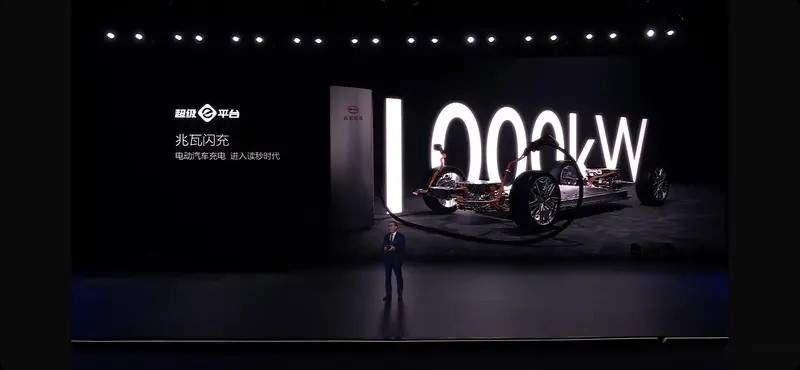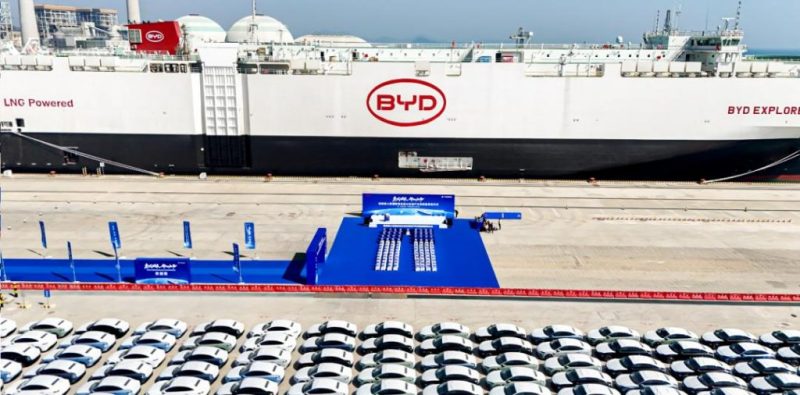BYD Sets Global Sales Target of 5.5 Million Units for 2025
 RobertMar 26, 2025, 02:42 PM
RobertMar 26, 2025, 02:42 PM
【PCauto】Recently, BYD CEO Wang Chuan-Fu announced the company's sales target for 2025, setting a total sales goal of 5.5 million units, with over 800,000 units aimed at markets outside of China.
Based on this target, BYD’s sales growth in its home market is expected to reach approximately 30%, while the growth in overseas markets is projected to be an astonishing 91.8%, with Southeast Asia identified as a key area for expansion.

Looking back at the global automotive market in 2024, Toyota maintained its position at the top with a global sales figure of 10.82 million units, despite a slight decline from previous years. Volkswagen followed in second place, with 9.03 million units sold, although its market share in some regions faced pressure. The Hyundai-Kia Group ranked third with sales of 7.23 million units, with Hyundai reporting 4.14 million units and Kia achieving a 0.1% growth to reach 3.09 million units. BYD climbed to the fifth largest automaker globally in 2024, selling 4.27 million vehicles.
BYD's sales target of 5.5 million units for 2025 is nearly comparable to Stellantis Group’s 5.69 million unit target for 2024. Stellantis, which includes well-known automotive brands such as Citroën, Fiat, and Maserati, has been a long-time player in the global automotive market.

In 2025, BYD plans to launch nearly 20 new models across its four brands while also upgrading or introducing smart driving versions for the existing 21 models. Just this March, BYD held six press conferences to announce its developments.
To achieve this ambitious goal, BYD is taking a dual approach focusing on both technology and market strategy. Technologically, BYD has upgraded its next-generation electric platform's charging power to 1000V, surpassing the 900V standards of mainstream automakers. In the realm of automation, BYD is leveraging its scale to reduce the cost of its advanced driving configuration, which includes the Nvidia Orin X and five millimeter-wave radars, to RM1,828, below the industry average, and has announced that all models will be equipped with advanced driving capabilities.

In terms of market strategy, in addition to consolidating its market share in China, BYD is intensifying its efforts in overseas markets, particularly in Southeast Asia. The company plans to pioneer the deployment of smart driving technology in overseas markets by 2026-2027, and currently possesses multiple auto transport ships. BYD aims to establish a fleet of eight roll-on/roll-off ships by 2026, expecting an annual capacity of over one million vehicles to ensure a reliable supply for overseas markets such as Southeast Asia.

For the Southeast Asian market, BYD’s large-scale entry is expected to transform the local automotive landscape. In recent years, demand for new energy vehicles in Southeast Asia has gradually increased, with various governments implementing policies to encourage the adoption of these vehicles. As BYD deepens its presence in the Southeast Asian market and works toward its global sales target of 5.5 million units, Japanese automotive brands, led by Toyota, may feel the impact.
If any infringement occurs, please contact us for deletion
Trending News

Perodua Myvi and Bezza may undergo major upgrades in 2026
After the update, the Bezza will no longer be just a low-cost alternative but a core model in the Perodua system with greater market competitiveness and brand premium potential. The upgrade of the Myvi is not to be unconventional but to strengthen the brand and market, ensuring that the Myvi continues to maintain its irreplaceable position in the new round of product competition.

Perodua Traz VS Ativa, which one is more worth buying?
Traz, as a newly launched mid-sized SUV, offers more spacious room and mainstream power compared to small SUVs, but its pricing appears slightly higher than that of Ativa. Ativa, on the other hand, is Perodua's long-time best-selling small SUV with more affordable pricing and a balanced combination of power and tech features.

Will the Toyota Yaris Cross come to Malaysia? If it comes, how much will it sell for?
The launch of Perodua Traz indicates that the market size of small SUVs in Malaysia has been expanding in recent years. However, the question naturally shifts back to Toyota. As a brand with the most comprehensive product line and a strong foundation in both the SUV and hybrid sectors, will Toyota choose the Yaris Cross to participate in this small SUV competition?

Perodua Traz VS Toyota Yaris Cross, where does the Traz fall short?
Before the official launch of the Perodua Traz, market expectations were actually very high because it shares the same DNGA platform as the Toyota Yaris Cross. However, sharing the same platform does not equate to the same experience, and the Traz's final performance has indeed been disappointing. Perhaps it is precisely because of the delayed launch that it has almost no competitiveness in the current competitive environment.

Perodua Traz 2025:Spec, Price and Features
Perodua Traz has been officially launched in Malaysia. It is a B-segment five-seater SUV built on the DNGA platform. Compared to the Yaris Cross, which emphasizes brand and quality, the Traz comes with a localized rate of about 95%, offering a more friendly price and practical features.
Popular Cars
Model Year
Car Compare
Car Photo

